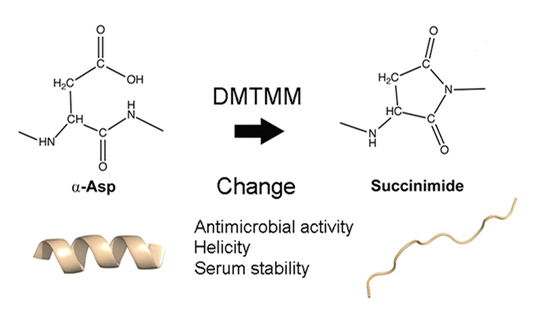
 中央研究院 生物化學研究所
中央研究院 生物化學研究所
The formation of succinimide in proteins has attracted considerable attention in protein aging and biopharmaceutical research. The succinimide formation occurs spontaneously in proteins and is prone to hydrolysis to yield aspartate and isoaspartate, resulting in altered protein functions. Herein, we demonstrated that the coupling reagent 4-(4,6-dimethoxy-1,3,5-triazin-2-yl)-4-methylmorpholinium chloride (DMTMM) can mediate intramolecular cyclization of aspartic acid to form succinimide efficiently in the LL37-derived short antimicrobial peptide KR12. The formation of succinimide in KR12 was confirmed by liquid chromatography tandem mass spectrometry and nuclear magnetic resonance. Moreover, the succinimide-containing KR12 displayed decreased antimicrobial activity, helicity, and serum stability in comparison with unmodified KR12. The succinimide formation usually changes the protein structure and function, and only in rare cases, it can help to maintain the protein stability. In addition to succinimide, DMTMM can also mediate intraresidue cyclization of N-terminal glutamate to form pyroglutamate. Our work thus provides a convenient and efficient method for preparation of succinimide/pyroglutamate-containing peptides, which can be used for studying their impact on peptide/protein function.
